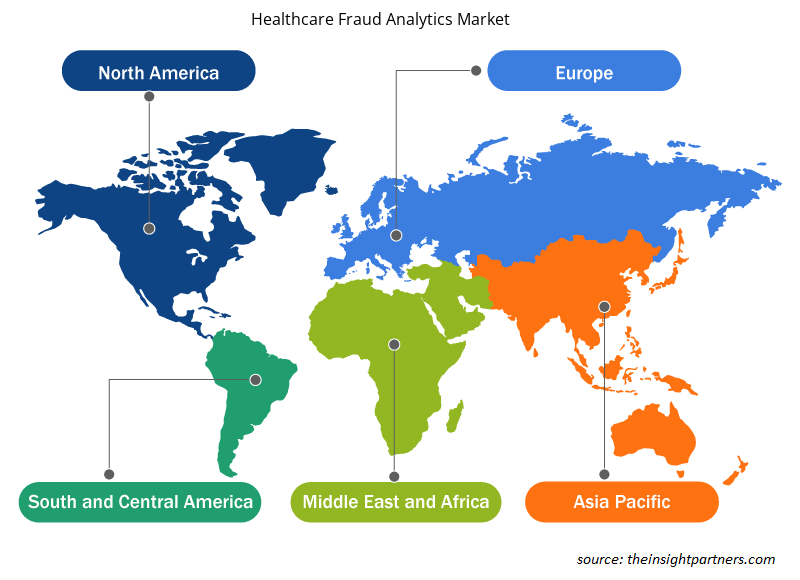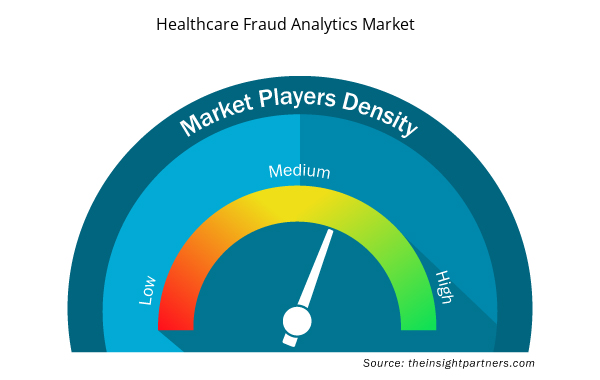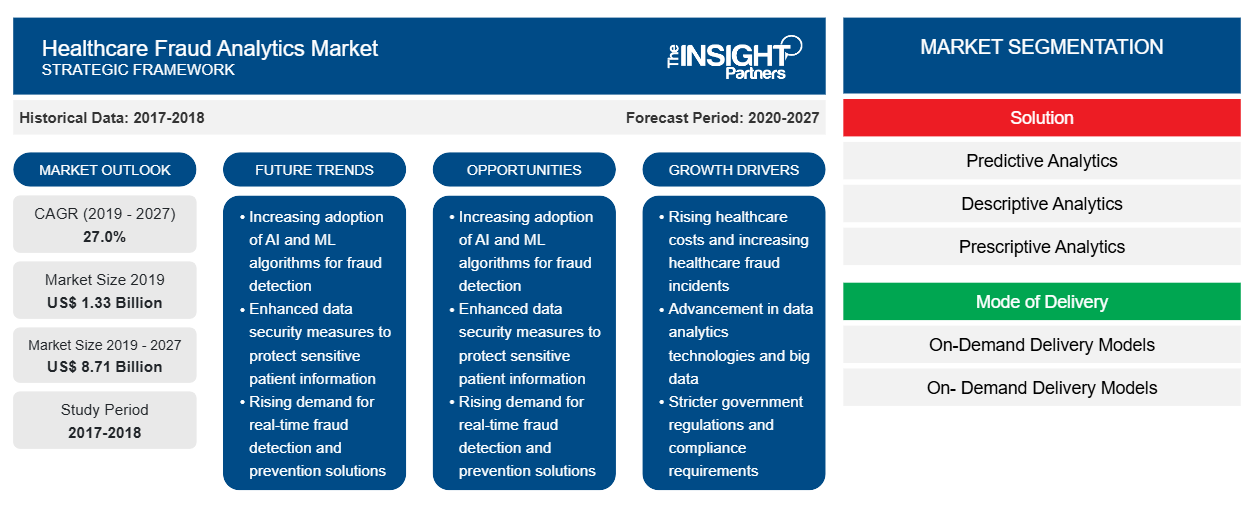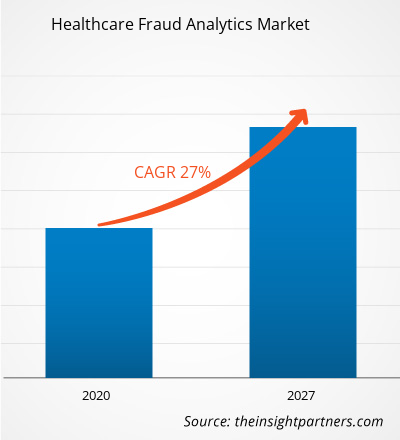医療詐欺分析市場は2019年に13億3,109万米ドルと評価され、2027年には87億773万米ドルに達すると予測されており、2020年から2027年にかけて27.0%のCAGRで成長すると予想されています。
医療詐欺は、利益を得るために不正な医療請求を行うホワイトカラー犯罪の一種です。医療詐欺の大半は、組織犯罪グループと少数の不正な医療提供者によって行われています。医療詐欺の最も一般的な種類には、より高価なサービスや手順の請求、保険適用外の治療の虚偽表示、保険金詐欺などがあります。世界の医療詐欺分析市場の成長は、すべての業界での詐欺事件の増加と、米国の医療保険業界の成長に起因しています。しかし、医療詐欺分析に関する懸念が、市場の成長を妨げる主な要因となっています。
世界の医療詐欺分析市場は、パンデミック後に大幅な成長が見込まれています。COVID-19は、ロックダウン、渡航禁止、事業停止により、さまざまな国の経済や産業に影響を及ぼしています。COVID-19危機は多くの国の公衆衛生システムに過度の負担をかけ、医療システムへの持続可能な投資の必要性を浮き彫りにしました。COVID-19パンデミックが進行するにつれて、ヘルスケア業界の成長は低下すると予想されています。ライフサイエンス分野は、体外診断製品の需要増加と世界的な研究開発活動の増加により繁栄しています。しかし、医療技術およびイメージング分野では、実施される手術数の減少と機器調達の遅延または長期化により、売上が減少しています。さらに、医療専門家による仮想相談は、パンデミック後の主流のケア提供モデルになると予想されています。遠隔医療がケアの提供を変革する中、デジタルヘルスは今後数年間繁栄し続けるでしょう。さらに、臨床試験の中断とそれに伴う医薬品の発売の遅れにより、将来的には完全にバーチャルな試験が行われるようになることも予想されます。mRNA などの新しい技術が登場し、製薬業界や市場を変革することが予想され、今後数年間で垂直統合や合弁事業がさらに進むことも予想されます。
要件に合わせてレポートをカスタマイズする
このレポートの一部、国レベルの分析、Excelデータパックなど、あらゆるレポートを無料でカスタマイズできます。また、スタートアップや大学向けのお得なオファーや割引もご利用いただけます。
- このレポートの主要な市場動向を入手してください。この無料サンプルには、市場動向から見積もりや予測に至るまでのデータ分析が含まれます。
市場分析
米国の医療保険業界の成長が世界の医療詐欺分析市場の成長を牽引
健康保険詐欺は、金銭的利益を得るために保険会社または代理店に対して行われる故意の欺瞞です。詐欺は、申請者、保険契約者、第三者の請求者、または請求者にサービスを提供する医療専門家によって、さまざまな取引ポイントで行われます。保険代理店や会社の従業員も保険詐欺を犯すことがあります。一般的な健康保険詐欺には、正当な請求を操作する水増し、保険申請書の事実の誇張、実際には発生していない病気や怪我の請求、事故の偽装などがあります。
米国には、医療保険を提供する健康保険会社が 900 社以上あります。また、米国では健康保険に加入している人の数が多いです。「米国の健康保険の適用範囲: 2018」というレポートによると、2018 年には人口の約 91.5% が健康保険に加入しています。このレポートでは、2018 年には米国では公的保険よりも民間の健康保険の方が普及しており、人口の約 67.3% が民間の健康保険に加入し、34.4% が公的保険に加入していたことも言及されています。サブタイプの中では、雇用主ベースの保険が最も一般的な健康保険で、人口の 55.1% を占めています。
医療保険業界の成長と医療保険詐欺の増加により、予測期間中に医療詐欺分析ソリューションの需要が増加すると予想されます。
ソリューションベースの洞察
ソリューションの面では、世界の医療詐欺分析市場は、予測分析、記述分析、および処方分析に分類されます。2019 年には、予測分析セグメントが市場で最大のシェアを占めました。さらに、同じセグメントは予測期間中に最高の CAGR を記録すると予測されています。
配信モードに基づく洞察
配信モードに基づいて、世界の医療詐欺分析市場は、オンプレミス配信モデルとクラウドベースの配信モデルに分類されます。オンプレミス配信モデルセグメントは、2019年に最大の市場シェアを占めました。ただし、クラウドベースの配信モデルセグメントは、予測期間中に最高のCAGRを記録すると予測されています。
アプリケーションベースの洞察
アプリケーションに基づいて、世界の医療詐欺分析市場は、保険金請求の審査、薬局の請求書の不正使用、支払いの整合性、医療 ID の盗難、およびその他のアプリケーションに分類されます。保険金請求セグメントは、2019 年に最大の市場シェアを占めました。また、同じセグメントは、予測期間中に最高の CAGR を記録すると予測されています。
エンドユーザーベースの洞察
エンドユーザーの観点から見ると、世界の医療詐欺分析市場は、政府機関、民間保険支払者、サードパーティのサービスプロバイダー、および雇用主に分かれています。政府機関セグメントは2019年に市場で最大のシェアを占め、予測期間中に同じセグメントが最高のCAGRを記録すると予測されています。
世界の医療詐欺分析市場のプレーヤーは、世界中で変化する顧客の需要に応えるために製品の発売と拡大の戦略を採用しており、これにより世界的にブランド名を維持することも可能になります。
医療詐欺分析市場の地域別洞察
予測期間を通じてヘルスケア詐欺分析市場に影響を与える地域的な傾向と要因は、Insight Partners のアナリストによって徹底的に説明されています。このセクションでは、北米、ヨーロッパ、アジア太平洋、中東およびアフリカ、南米および中米にわたるヘルスケア詐欺分析市場のセグメントと地理についても説明します。

- 医療詐欺分析市場の地域別データを入手
医療詐欺分析市場レポートの範囲
| レポート属性 | 詳細 |
|---|---|
| 2019年の市場規模 | 13億3千万米ドル |
| 2027年までの市場規模 | 87億1000万米ドル |
| 世界のCAGR(2019年 - 2027年) | 27.0% |
| 履歴データ | 2017-2018 |
| 予測期間 | 2020-2027 |
| 対象セグメント | ソリューション別
|
| 対象地域と国 | 北米
|
| 市場リーダーと主要企業プロフィール |
|
ヘルスケア詐欺分析市場のプレーヤー密度:ビジネスダイナミクスへの影響を理解する
ヘルスケア詐欺分析市場は、消費者の嗜好の変化、技術の進歩、製品の利点に対する認識の高まりなどの要因により、エンドユーザーの需要が高まり、急速に成長しています。需要が高まるにつれて、企業は提供を拡大し、消費者のニーズを満たすために革新し、新たなトレンドを活用し、市場の成長をさらに促進しています。
市場プレーヤー密度とは、特定の市場または業界内で活動している企業または会社の分布を指します。これは、特定の市場スペースに、その市場規模または総市場価値に対してどれだけの競合相手 (市場プレーヤー) が存在するかを示します。
ヘルスケア詐欺分析市場で活動している主要企業は次のとおりです。
- 株式会社コンデュエント
- DXCテクノロジー
- Scioinspire株式会社
- FICO
- オプタム株式会社
免責事項:上記の企業は、特定の順序でランク付けされていません。

- ヘルスケア詐欺分析市場のトップキープレーヤーの概要を入手
世界の医療詐欺分析市場 – ソリューション別
- 予測分析
- 記述的分析
- 処方的分析
世界の医療詐欺分析市場 – 提供方法別
- オンプレミス配信モデル
- クラウドベースの配信モデル
世界の医療詐欺分析市場 – アプリケーション別
- 保険金請求の審査
- 薬局請求書の不正使用
- 支払いの整合性
- 医療個人情報の盗難
- その他のアプリケーション
世界の医療詐欺分析市場 – エンドユーザー別
- 政府機関
- 民間保険支払者
- サードパーティのサービスプロバイダー
- 雇用主
世界の医療詐欺分析市場 – 地域別
北米
- 私たち
- カナダ
- メキシコ
ヨーロッパ
- フランス
- ドイツ
- イタリア
- 英国
- スペイン
- その他のヨーロッパ
アジア太平洋(APAC)
- 中国
- インド
- 韓国
- 日本
- オーストラリア
- その他のアジア太平洋地域
中東・アフリカ(MEA)
- 南アフリカ
- サウジアラビア
- アラブ首長国連邦
- MEAの残り
南米と中央アメリカ(SCAM)
- ブラジル
- アルゼンチン
- 残りの詐欺
企業プロフィール
- 株式会社コンデュエント
- DXCテクノロジー
- Scioinspire株式会社
- オプタム株式会社
- SASインスティテュート
- ポンデラソリューションズ
- レキシスネクシスリスクソリューション
- フェア・アイザック・アンド・カンパニー(FICO)
- 株式会社コティビティ
- ホワイトハタイ
- 過去2年間の分析、基準年、CAGRによる予測(7年間)
- PEST分析とSWOT分析
- 市場規模価値/数量 - 世界、地域、国
- 業界と競争環境
- Excel データセット



Report Coverage
Revenue forecast, Company Analysis, Industry landscape, Growth factors, and Trends

Segment Covered
This text is related
to segments covered.

Regional Scope
North America, Europe, Asia Pacific, Middle East & Africa, South & Central America

Country Scope
This text is related
to country scope.
よくある質問
As per the Global Health Care Anti-Fraud Network, each year approximately US$ 260 billion (180 billion euros) or about 6 percent of the global total health care expenditure is lost to fraud. The number of healthcare frauds is increasing in the US. Some government and law enforcement agencies also estimated that healthcare frauds cost around 10% of the total annual health expenditure, which could be around US $300 billion.
Healthcare fraud is a kind of white-collar crime that includes the filing of dishonest health care claims to turn a profit. The majority of health care fraud is committed by organized crime groups and a small minority of fraudulent health care providers. The most common types of health care fraud include billing for more expensive services or procedures, misrepresenting non-covered treatments, insurance frauds, and others.
factors such as rising number of healthcare fraudulent cases across the globe and growing health insurance industry are expected to boost the market growth over the years. Moreover, growing hospital industry is likely to have a positive impact on the growth of the market in coming years.
Trends and growth analysis reports related to Technology, Media and Telecommunications : READ MORE..
The List of Companies – Global Healthcare Fraud Analytics Market
- Conduent Inc.
- DXC Technology
- Scioinspire, Corp.
- FICO
- Optum, Inc.
- SAS Institute
- Pondera Solutions
- Lexisnexis Risk Solutions
- Whitehatai
- Cotiviti, Inc.
The Insight Partners performs research in 4 major stages: Data Collection & Secondary Research, Primary Research, Data Analysis and Data Triangulation & Final Review.
- Data Collection and Secondary Research:
As a market research and consulting firm operating from a decade, we have published and advised several client across the globe. First step for any study will start with an assessment of currently available data and insights from existing reports. Further, historical and current market information is collected from Investor Presentations, Annual Reports, SEC Filings, etc., and other information related to company’s performance and market positioning are gathered from Paid Databases (Factiva, Hoovers, and Reuters) and various other publications available in public domain.
Several associations trade associates, technical forums, institutes, societies and organization are accessed to gain technical as well as market related insights through their publications such as research papers, blogs and press releases related to the studies are referred to get cues about the market. Further, white papers, journals, magazines, and other news articles published in last 3 years are scrutinized and analyzed to understand the current market trends.
- Primary Research:
The primarily interview analysis comprise of data obtained from industry participants interview and answers to survey questions gathered by in-house primary team.
For primary research, interviews are conducted with industry experts/CEOs/Marketing Managers/VPs/Subject Matter Experts from both demand and supply side to get a 360-degree view of the market. The primary team conducts several interviews based on the complexity of the markets to understand the various market trends and dynamics which makes research more credible and precise.
A typical research interview fulfils the following functions:
- Provides first-hand information on the market size, market trends, growth trends, competitive landscape, and outlook
- Validates and strengthens in-house secondary research findings
- Develops the analysis team’s expertise and market understanding
Primary research involves email interactions and telephone interviews for each market, category, segment, and sub-segment across geographies. The participants who typically take part in such a process include, but are not limited to:
- Industry participants: VPs, business development managers, market intelligence managers and national sales managers
- Outside experts: Valuation experts, research analysts and key opinion leaders specializing in the electronics and semiconductor industry.
Below is the breakup of our primary respondents by company, designation, and region:

Once we receive the confirmation from primary research sources or primary respondents, we finalize the base year market estimation and forecast the data as per the macroeconomic and microeconomic factors assessed during data collection.
- Data Analysis:
Once data is validated through both secondary as well as primary respondents, we finalize the market estimations by hypothesis formulation and factor analysis at regional and country level.
- Macro-Economic Factor Analysis:
We analyse macroeconomic indicators such the gross domestic product (GDP), increase in the demand for goods and services across industries, technological advancement, regional economic growth, governmental policies, the influence of COVID-19, PEST analysis, and other aspects. This analysis aids in setting benchmarks for various nations/regions and approximating market splits. Additionally, the general trend of the aforementioned components aid in determining the market's development possibilities.
- Country Level Data:
Various factors that are especially aligned to the country are taken into account to determine the market size for a certain area and country, including the presence of vendors, such as headquarters and offices, the country's GDP, demand patterns, and industry growth. To comprehend the market dynamics for the nation, a number of growth variables, inhibitors, application areas, and current market trends are researched. The aforementioned elements aid in determining the country's overall market's growth potential.
- Company Profile:
The “Table of Contents” is formulated by listing and analyzing more than 25 - 30 companies operating in the market ecosystem across geographies. However, we profile only 10 companies as a standard practice in our syndicate reports. These 10 companies comprise leading, emerging, and regional players. Nonetheless, our analysis is not restricted to the 10 listed companies, we also analyze other companies present in the market to develop a holistic view and understand the prevailing trends. The “Company Profiles” section in the report covers key facts, business description, products & services, financial information, SWOT analysis, and key developments. The financial information presented is extracted from the annual reports and official documents of the publicly listed companies. Upon collecting the information for the sections of respective companies, we verify them via various primary sources and then compile the data in respective company profiles. The company level information helps us in deriving the base number as well as in forecasting the market size.
- Developing Base Number:
Aggregation of sales statistics (2020-2022) and macro-economic factor, and other secondary and primary research insights are utilized to arrive at base number and related market shares for 2022. The data gaps are identified in this step and relevant market data is analyzed, collected from paid primary interviews or databases. On finalizing the base year market size, forecasts are developed on the basis of macro-economic, industry and market growth factors and company level analysis.
- Data Triangulation and Final Review:
The market findings and base year market size calculations are validated from supply as well as demand side. Demand side validations are based on macro-economic factor analysis and benchmarks for respective regions and countries. In case of supply side validations, revenues of major companies are estimated (in case not available) based on industry benchmark, approximate number of employees, product portfolio, and primary interviews revenues are gathered. Further revenue from target product/service segment is assessed to avoid overshooting of market statistics. In case of heavy deviations between supply and demand side values, all thes steps are repeated to achieve synchronization.
We follow an iterative model, wherein we share our research findings with Subject Matter Experts (SME’s) and Key Opinion Leaders (KOLs) until consensus view of the market is not formulated – this model negates any drastic deviation in the opinions of experts. Only validated and universally acceptable research findings are quoted in our reports.
We have important check points that we use to validate our research findings – which we call – data triangulation, where we validate the information, we generate from secondary sources with primary interviews and then we re-validate with our internal data bases and Subject matter experts. This comprehensive model enables us to deliver high quality, reliable data in shortest possible time.


 このレポートの無料サンプルを入手する
このレポートの無料サンプルを入手する